外研版(2019)英语选择性必修四Unit1 Looking forwards Grammar课件 (60张ppt)
文档属性
| 名称 | 外研版(2019)英语选择性必修四Unit1 Looking forwards Grammar课件 (60张ppt) |  | |
| 格式 | pptx | ||
| 文件大小 | 17.7MB | ||
| 资源类型 | 教案 | ||
| 版本资源 | 外研版(2019) | ||
| 科目 | 英语 | ||
| 更新时间 | 2023-02-07 17:48:04 | ||
图片预览

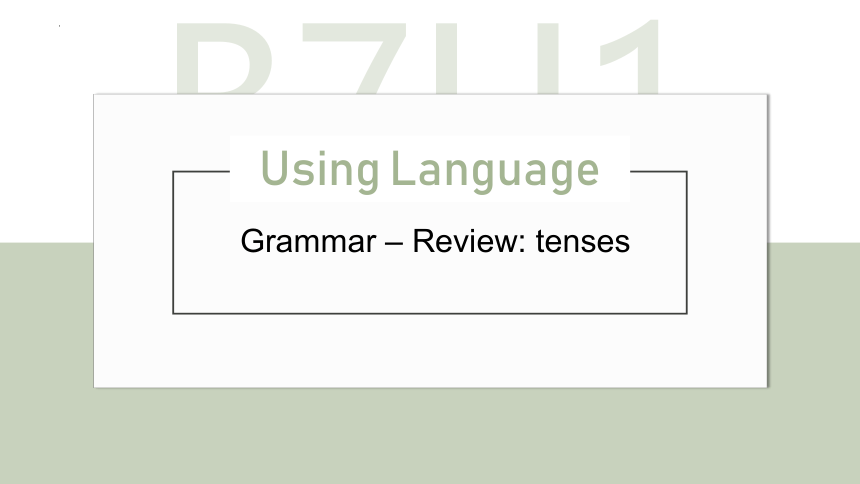

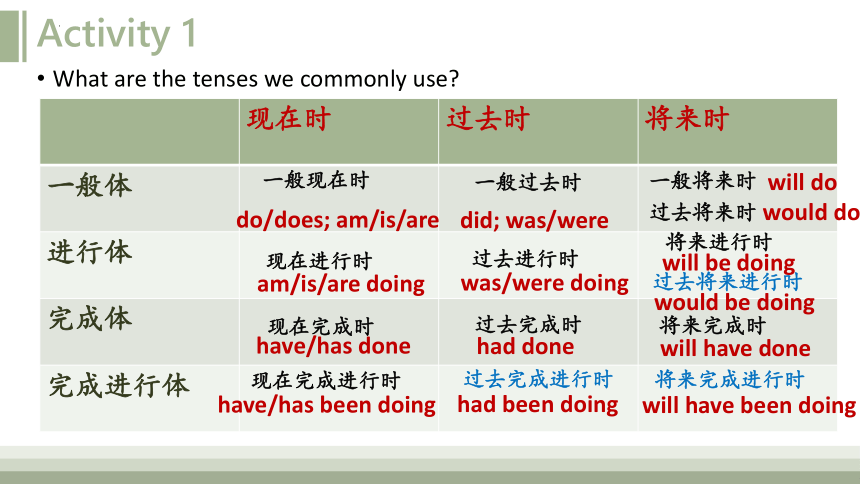
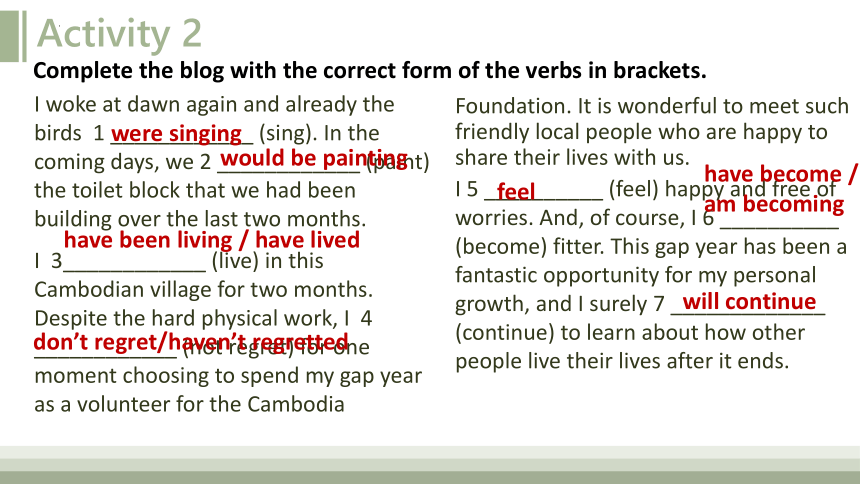

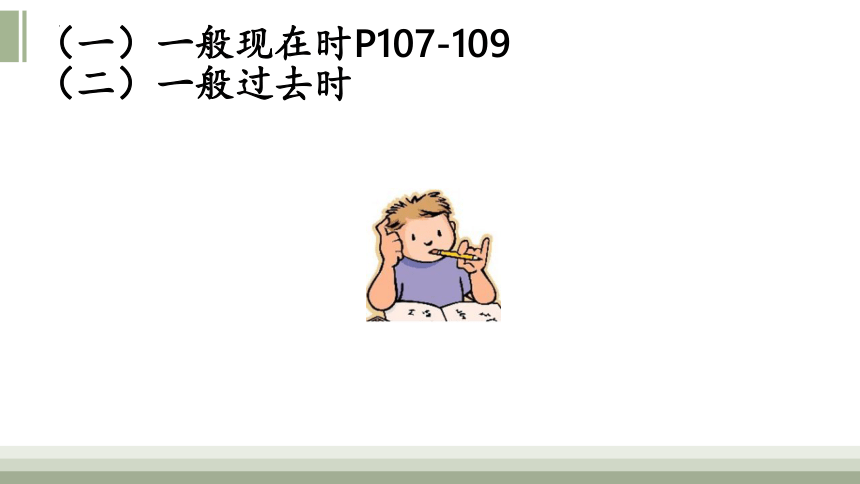
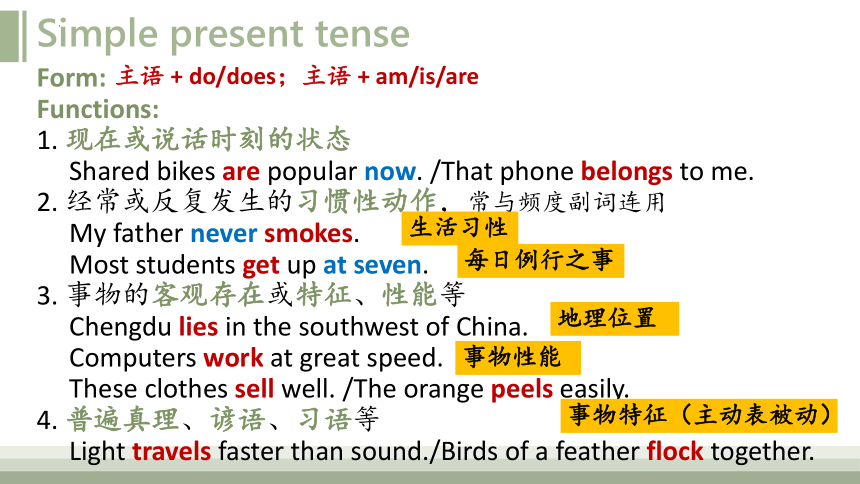
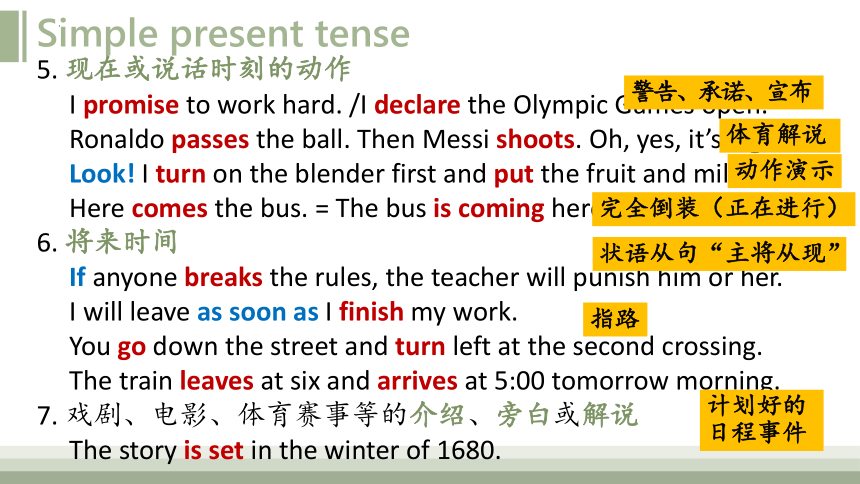
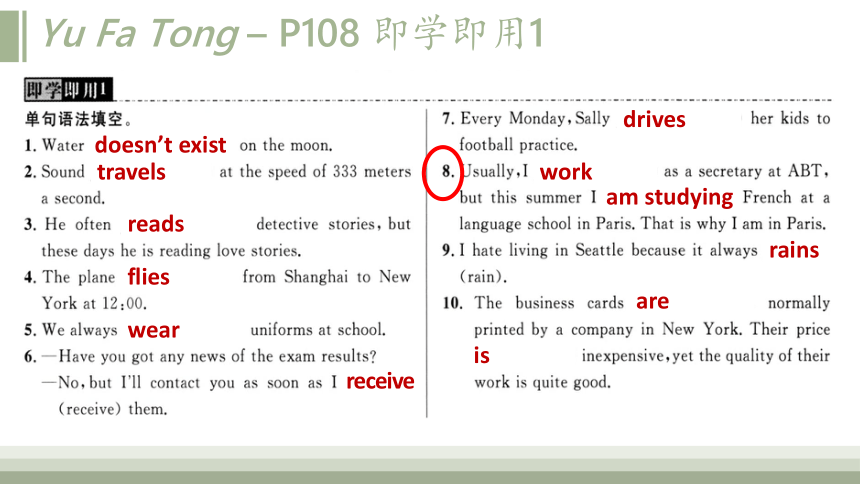
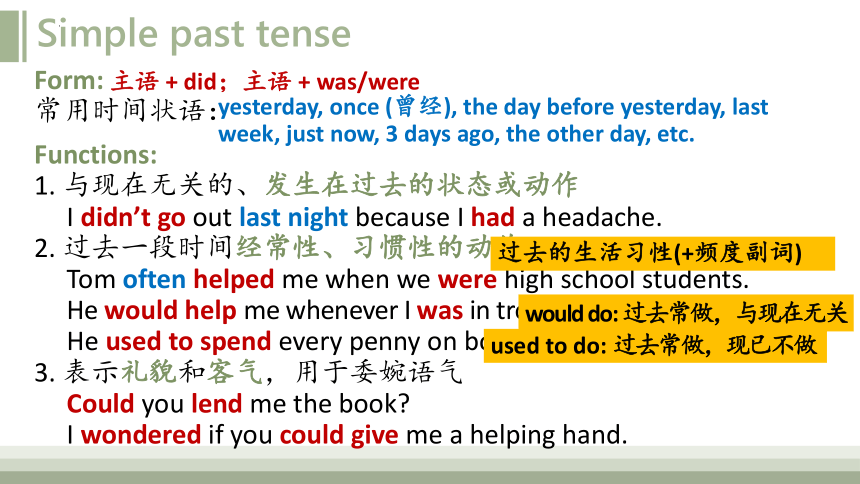
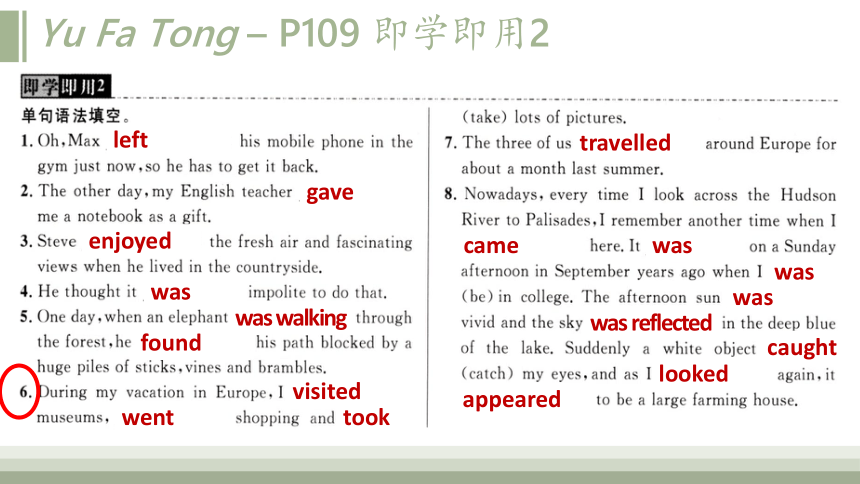
文档简介
(共60张PPT)
Looking Forwards
Book 7 Unit 1
B7U1
Using Language
Grammar – Review: tenses
Look at the sentences from the reading passage. Decide which tense each is in and match the tenses to what they describe.
Activity 1
d
b
a
f
c
e
The present perfect tense
The future continuous tense
The past future tense
The past perfect tense
The past continuous tense
The present perfect continuous tense
Activity 1
What are the tenses we commonly use
现在时 过去时 将来时
一般体
进行体
完成体
完成进行体
一般现在时
现在进行时
现在完成时
现在完成进行时
一般过去时
过去进行时
过去完成时
过去完成进行时
一般将来时
将来进行时
将来完成时
将来完成进行时
过去将来时
过去将来进行时
do/does; am/is/are
did; was/were
will do
would do
am/is/are doing
would be doing
will be doing
was/were doing
have/has done
had done
will have done
have/has been doing
had been doing
will have been doing
Foundation. It is wonderful to meet such friendly local people who are happy to share their lives with us.
I 5 __________ (feel) happy and free of worries. And, of course, I 6 __________ (become) fitter. This gap year has been a fantastic opportunity for my personal growth, and I surely 7 _____________ (continue) to learn about how other people live their lives after it ends.
Complete the blog with the correct form of the verbs in brackets.
I woke at dawn again and already the birds 1 ____________ (sing). In the coming days, we 2 ____________ (paint) the toilet block that we had been building over the last two months.
I 3____________ (live) in this Cambodian village for two months. Despite the hard physical work, I 4 ____________ (not regret) for one moment choosing to spend my gap year as a volunteer for the Cambodia
Activity 2
were singing
would be painting
have been living / have lived
feel
have become / am becoming
will continue
don’t regret/haven’t regretted
Important and difficult points
现在时 过去时 将来时
一般体
进行体
完成体
完成进行体
一般现在时
现在进行时
现在完成时
现在完成进行时
一般过去时
过去进行时
过去完成时
过去完成进行时
一般将来时
将来进行时
将来完成时
将来完成进行时
过去将来时
过去将来进行时
do/does; am/is/are
did; was/were
will do
would do
am/is/are doing
would be doing
will be doing
was/were doing
have/has done
had done
will have done
have/has been doing
had been doing
will have been doing
(一)一般现在时P107-109
(二)一般过去时
Simple present tense
Form:
Functions:
1. 现在或说话时刻的状态
Shared bikes are popular now. /That phone belongs to me.
2. 经常或反复发生的习惯性动作,常与频度副词连用
My father never smokes.
Most students get up at seven.
3. 事物的客观存在或特征、性能等
Chengdu lies in the southwest of China.
Computers work at great speed.
These clothes sell well. /The orange peels easily.
4. 普遍真理、谚语、习语等
Light travels faster than sound./Birds of a feather flock together.
地理位置
事物性能
事物特征(主动表被动)
生活习性
每日例行之事
主语 + do/does;主语 + am/is/are
Simple present tense
5. 现在或说话时刻的动作
I promise to work hard. /I declare the Olympic Games open.
Ronaldo passes the ball. Then Messi shoots. Oh, yes, it’s a goal.
Look! I turn on the blender first and put the fruit and milk into it.
Here comes the bus. = The bus is coming here.
6. 将来时间
If anyone breaks the rules, the teacher will punish him or her.
I will leave as soon as I finish my work.
You go down the street and turn left at the second crossing.
The train leaves at six and arrives at 5:00 tomorrow morning.
7. 戏剧、电影、体育赛事等的介绍、旁白或解说
The story is set in the winter of 1680.
动作演示
完全倒装(正在进行)
状语从句“主将从现”
警告、承诺、宣布
体育解说
计划好的日程事件
指路
Yu Fa Tong – P108 即学即用1
doesn’t exist
travels
reads
flies
wear
receive
drives
work
am studying
rains
are
is
Simple past tense
Form:
常用时间状语:
Functions:
1. 与现在无关的、发生在过去的状态或动作
I didn’t go out last night because I had a headache.
2. 过去一段时间经常性、习惯性的动作
Tom often helped me when we were high school students.
He would help me whenever I was in trouble.
He used to spend every penny on books.
3. 表示礼貌和客气,用于委婉语气
Could you lend me the book
I wondered if you could give me a helping hand.
used to do: 过去常做,现已不做
过去的生活习性(+频度副词)
would do: 过去常做,与现在无关
主语 + did;主语 + was/were
yesterday, once (曾经), the day before yesterday, last week, just now, 3 days ago, the other day, etc.
Yu Fa Tong – P109 即学即用2
left
gave
enjoyed
was
was walking
found
visited
went
took
travelled
came
was
was
was
was reflected
caught
looked
appeared
(三)一般将来时P109-110
Yu Fa Tong – P110 即学即用3
will call
are
going to start
have given up
is coming/
will come
will get
is going to be
will be
will be fined
will come
comes
will have/am going to have
am going to give up
Functions:
Simple future tense
1. will 2. be going to
1) 将来要发生的必然趋势或事实
He will be twenty next week.
2) 主观意愿或临时的决定
– I hear that Kate is in hospital.
– If so, I will go to see her right now.
3) 观点或对未来的推测
Perhaps they will win the match.
I’m sure he will come.
I wonder if she will come to my party.
1) 现在主观打算或计划好的事情
He is going to propose to his girlfriend.
He will propose to his girlfriend.
2) 种种迹象表明要发生的事情。
Look at the dark clouds. It is going to be a storm.
常与believe, be afraid, be sure, wonder等动词或perhaps, probably等副词连用
(四)现在进行时P110
Present continuous tense
Form:
常用时间状语:
Functions:
1. 现在正在进行的动作
Listen! Phoebe is playing the guitar in the bedroom.
Why is the baby crying
2. 现阶段在进行、但说话时不一定正在进行的动作
Shared bikes are getting more and more popular.
Rachel is learning Spanish these days.
Professor Wang is writing a book.
主语 + am/is/are doing
now, these days, right now, etc.
look, listen等提醒听话人注意正在发生的事情
Present continuous tense
3. 反复发生的动作,含有感彩。
You are forever changing your mind.
Scott is constantly finding fault with me.
He is always staying up too late.
He always stays up too late.
4. 安排好的将来(见一般将来时)
My friend is coming for dinner tonight.
5. 委婉的语气和殷切的心情
I’m looking forward to your reply. /I’m hoping that the leaders will support us.
6. 表示感觉、状态、喜好、想法的动词一般不用现在进行时。
I totally believe his words.
The food tastes delicious.
Ross likes telling jokes.
不满
常与always, forever, constantly, continually连用
责备
不满
陈述事实
Yu Fa Tong – P111 即学即用4
am working
is leaving
/will stay
is crying
is speaking
am
reading
is
complaining
is being
are landing
are saving
is weeping
is going to stay
painted
(五)过去进行时P111-112
(六)将来将来时
Summary – Past & Future continuous tense
某一时刻
某一时间段
现在进行时
某个时间正在
Yu Fa Tong – P111 即学即用5
was sitting
was doing
was running /had run
was making
was sleeping
called
answered
was taking
spoke
didn’t know
was talking
was looking
was trying
Yu Fa Tong – P112 即学即用6
will be waiting
will be taking
don’t want
won’t recognize
will be wearing
will be taking
will be
will be flying
will be having
go
having
(七)现在完成时P112
Present perfect tense
Form:
常用时间状语:
Functions:
1. 过去开始的动作或状态持续到现在,还可能延续
He has been in the army for five years.
He was in the army for five years.
We have waited all day.
We waited all day.
2. 过去开始的动作到现在已经结束
He has turned the light off.
I have already found my pen.
主语 + have/has done
for + 一段时间, since + 过去时间点/一般过去时从句, already, yet, ever, never, just (刚才), before, once (一次), twice, three times, lately, recently, so far, up to now, till now, in the last/past few years, the first time
多用延续性动词,如 wait, stay, keep, be, study等
现在仍在部队
现在不在部队
现在还在等
现在没等了
用非延续性动词,与表示不定的过去时间 (already, yet, before, recently, etc.)、频度副词(never, ever, etc.)、包括现在时刻在内的时间(this morning/month/year..., today, etc.)连用
Present perfect tense
3. 过去发生的事情对现在有影响
The lift broke down.
The lift has broken down.
I lived in Chengdu for 10 years.
I have lived in Chengdu for 10 years.
4. 过去的经历
Maria has been to America twice.
Leo has gone to Paris.
5. 现在完成时常在新闻中用来引出话题,而一般过去时用来叙述具体的过去事件。
The prisoners have escaped. They used a ladder, climbed the wall and then got away.
Prices of jewelry have been stolen. The thief broke the window with a hammer and entered the shop. He went away in a stolen car.
曾坏过,对现在没影响
仍是坏的,现在不能使用
现已不住成都
到目前为止住了十年且可能继续住
have been to: 去过已回
have gone to: 去了还未回
Yu Fa Tong – P114 即学即用7
has been married
has betrayed
took
haven’t
had
has repaired
have known
am reading
has gone
has found
/has been repairing
/will find
haven’t
finished
has rained
has stopped
have finished
has read
has claimed
has gone to
has been to
has been in
(十)现在完成进行时P116
Present perfect continuous tense
现在完成时 VS 现在完成进行时
1. 二者都可以表示动作还未完成并且会延续
They have been living in this city for ten years.
They have lived in this city for ten years.
I have been working here for five years.
I have worked here for five years.
2. 现在完成时可以表示动作已经完成
I have been washing the car.
I have washed the car.
He has been taking photos.
He has taken some photos.
未完成,还需继续洗
已经洗好了
在这个城市已经住了10年
(动作还将继续下去)
在这里已经工作五年
(动作还将继续下去)
仍拿着相机在拍照
已经拍好了
Present perfect continuous tense
现在完成时 VS 现在完成进行时
3. 状态动词只能用于现在完成时
I have already had a new cellphone.
I have been having a new cellphone.
4. 现在完成进行时没有被动形式
We have been repairing the car.
The car has been being repaired.
×
×
Yu Fa Tong – P116 即学即用10
has made/will make
have been taking
believe
haven’t
have been waiting
have been ringing
have been cooking
have made
am cooking
am
have been painting
has been writing
will win
agree
has been
preparing
have been looking
has been
playing
(八)过去完成时P114-115
(九)将来完成时
Past perfect tense
Form:
常用时间状语:
3. 特殊句式:“一……就……”
I had no sooner left the room than the phone rang.
= No sooner had I left the room than the phone rang.
Tina had hardly closed her eyes when someone knocked at the door.
We had scarcely got dressed when it began to rain.
主语 + had done
含有by the time, before, after, when引导的表示过去的时间状语从句的主句中;
told, said, heard, knew等后面的宾语从句中
Yu Fa Tong – P115 即学即用8
died
went
had reigned
had gone
left
had learned
saw
had occupied
wrote
hadn’t sent
hadn’t copied
has changed
arrived
had finished
were clapping
had given/gave
Future perfect tense
Form:
常用时间状语:
Functions:
1. 在将来某个时间为止势必会完成或预计会完成的动作
By the time you get home, I will have cleaned the house from top to bottom.
2. 某种状况会一直持续到说话人所提及的某一将来时间
I will have lived here for 5 years by the end of next week.
主语 + will/shall have done
by the end of, by the time, before/by + 将来时间
Yu Fa Tong – P115 即学即用9
will have finished
will have covered
will have earned
will have been married
pick
will have had
will have finished
will have risen
will have gone
will have
changed
will have worked
Summary – Past & Future perfect tense
过去某一时间点
没有实现
将来某个时间
将来时间
(十一)过去将来时P117
Past future tense
Form:
常用时间状语:
Functions:
1. 立足过去,放眼未来(常用于宾语从句和间接引语)
I wondered what would happen in the future.
Years ago, people didn’t know air pollution would become such a serious problem.
2. 过去习惯性的动作,常用would do
Whenever he had time, he would do some reading.
3. 虚拟语气中非真实的动作或状态
If I were you, I would not do that.
If I had a chance to study abroad, I would choose Harvard University.
主语 + was/were going to do;主语 + would/should do
at eight the next morning, after the following two days, the next Friday, five years later
Yu Fa Tong – P117 即学即用11
called
would come
said
told
would get
promised
would lend
was
knew
would be
would be
washed
didn’t
forgot
had told
would wash
would help
would remind
were
would get
would sign
Summary – Past future tense
过去某个时间
过去习惯性的
虚拟
B7U1
Using Language
Listening and speaking – Choices and decisions
Activity 5
Read the conversation and answer the questions.
1 What difficult decision is Li Ling facing
2 What does Jenny suggest to her
3 What would you do when faced with a difficult decision
Activity 5
Read the conversation and answer the questions.
1 What difficult decision is Li Ling facing
She has to make a choice between studying physics at her dream university, as she has been admitted without taking any exam, and taking the college entrance exam and applying to the Medical School. She can’t make up her mind what the right thing to do is.
Activity 5
Read the conversation and answer the questions.
2 What does Jenny suggest to her
Go for her preferred major
Put off making a decision until she has spoken to her high school advisor
Go for lunch & then weigh up the options and try to come to a decision
3 What would you do when faced with a difficult decision
Activity 5
Pay attention to the expressions in bold.
reject (someone or something) out of hand
To dismiss, deny, or refuse someone or
something immediately and without due discussion or consideration.
make up one’s mind
pass up the opportunity
have second thoughts
put off making a decision
reject something/someone out of hand
weigh up the options
权衡选择
下定决心
放弃机会
重新考虑
推迟做决定
未经适当讨论或考虑拒绝某人或某事
indecision:
the state of being unable to decide
= indecisiveness
迟疑不决
Activity 6
Read the statements and complete the sentences with the expressions in Activity 5.
1 May is ________________________.
2 Jane is _________________________.
3 Paul finds it easy ___________________.
having second thoughts
putting off making a decision
make up his mind
Activity 6
Read the statements and complete the sentences with the expressions in Activity 5.
4 Bill is _____________________________.
5 Amanda wants to ___________________.
6 Jia Ying has decided to _______________.
rejecting something out of hand
weigh up the options
pass up the opportunity
It’s crucial for teenagers to develop ________ mature and responsible members of society. In addition to ________ (participate) in school, a part-time job can also be helpful in this transition. It can help them achieve new accomplishments, learn about society and become ________ (dependent).
Many ________ (country) now have laws to regulate part-time ________ (employ) for students. In the UK, for example, the law states that students ________ (age) 15 and 16 ________ to work a maximum of 12 hours per week during term time, and 35 hours per week during school holidays. They are not allowed to work before 7 am or after 7 pm.
Read the passage, fill in the blanks and answer the questions.
into
participation
more independent
countries
employment
aged
are allowed
What regulations are in place for students doing part-time jobs in the UK
2. Have you ever had a part-time job Why did you do it
Students aged 15 and 16
During term time
≤ 12 hrs/wk
During holidays
≤ 35 hrs/wk
Work time
7 am – 7 pm
Activity 7
Activity 8
Which part-time job would you apply for
Listen to the interview and choose the job Richard applied for.
Activity 9
Listen again and complete the notes.
Why did Richard apply for this job
Because he has always been interested in 1 _____________________.
What did Richard do in his previous holiday
He worked in a youth hostel in Vietnam, 2 _____________________________.
He worked 3 ______________________________ in Bali.
He 4 _______________________________ in Thailand.
Why does Richard believe he is suitable for the job
Because he is a 5__________ and outgoing person, and feels happy when 6__________.
His 7_____________________________ have made him a flexible individual.
8 ______________________________________ is relevant.
Why did Richard do part-time job
Because he 9 ________________________________ his holiday times.
Because the experiences would 10 ___________________________________________.
dealing with people
guiding visitors to local sites
as a lifeguard on the beach
worked selling food at a street stall
friendly
he is working hard to satisfy people
travel experiences
His previous work experience
desires to make the best use of
prepare him for his future college application
Will Richard get the job Why
Writing an application letter
Read the job advertisement and the application letter.
Writing an application letter
Match the headings to the sections and find out how qualified the applicant is for the job (Ex. 5).
e
g
c
f
a
b
d
Collect smart expressions
Dear Ms Smith,
I wish to apply for the position of a local tour guide as advertised in the Daily News on 30 June.
I'm very familiar with the history of my home city, and have a passion for history. This role would enable me to help bring our history to life for visitors and promote local culture. As I plan to work in the tourism industry after graduation, I would welcome the opportunity to gain experience in this field.
As (is) stated in my attached CV, I can speak both English and French fluently. English is my native language, and I'm majoring in French at university. I also attended an exchange programme in Paris last year, which further improved my French language skills.
curriculum vitae/k r kj l m vi ta /n. (求职用的)履历,简历
Writing an application letter
Although I’m not a professional tour guide, I organised and conducted a tour of my city for classmates living outside the area, for which I received excellent feedback. What’s more, I’m a quick learner, and am willing to start at the beginning when necessary.
I would be delighted to have the opportunity to discuss my application further with you. I'm contactable via email at this address or by phone on 6747-9818. Thank you for your time and consideration.
Yours sincerely,
Josie Davis
I would appreciate it if I could have the opportunity/you could take my application into consideration.
Read the job advertisement and plan for your application letter by answering the questions.
refreshments [ pl.] drinks and small amounts of food that are provided or sold to people in a public place or at a public event
(在公共活动场所供应或销售的)饮料,小食
Light refreshments will be served during the break.
中间休息时有点心供应。
If you photocopy a document, you make a copy of it using a photocopier.
复印
1) What job are you applying for Where did you find the job vacancy
2) What previous experience makes you suitable for the job
3) What relevant qualifications and language skills do you have
Now write the application letter.
Read the job advertisement and plan for your application letter by answering the questions.
You can apply for the job you want most.
Discuss in pairs.
Work in pairs:
Make improvements to each other’s application letters, paying particular attention to the structure and language.
I wish to apply for the position of office assistant as advertised in China News Report on 23 September.
I’m skilled in the use of computers, and I have a great interest in online technology. I believe my skills would enable me to contribute to the smooth operation of your office.
As I plan to work in an administrative post after graduation, I would welcome the opportunity to gain experience in this field. As stated in my attached CV, I am well prepared for a variety of tasks, including document filing, photocopying and arranging refreshments. English is my native language, and I’m majoring in French at university.
Dear Ms Lee,
Although I have not held the position of office assistant before, I did work in a major department store for a few weeks, five days per week on morning shift, and I was regarded as a valuable addition to the sales team. I am capable of learning quickly, and willing to start with the basics wherever it is necessary.
Should you consider me a suitable candidate to interview, I’m contactable at your convenience at samhanson@ or by phone on 8969-7616. Thank you for your time and consideration.
Yours faithfully,
Sam Hanson
Looking Forwards
Book 7 Unit 1
B7U1
Using Language
Grammar – Review: tenses
Look at the sentences from the reading passage. Decide which tense each is in and match the tenses to what they describe.
Activity 1
d
b
a
f
c
e
The present perfect tense
The future continuous tense
The past future tense
The past perfect tense
The past continuous tense
The present perfect continuous tense
Activity 1
What are the tenses we commonly use
现在时 过去时 将来时
一般体
进行体
完成体
完成进行体
一般现在时
现在进行时
现在完成时
现在完成进行时
一般过去时
过去进行时
过去完成时
过去完成进行时
一般将来时
将来进行时
将来完成时
将来完成进行时
过去将来时
过去将来进行时
do/does; am/is/are
did; was/were
will do
would do
am/is/are doing
would be doing
will be doing
was/were doing
have/has done
had done
will have done
have/has been doing
had been doing
will have been doing
Foundation. It is wonderful to meet such friendly local people who are happy to share their lives with us.
I 5 __________ (feel) happy and free of worries. And, of course, I 6 __________ (become) fitter. This gap year has been a fantastic opportunity for my personal growth, and I surely 7 _____________ (continue) to learn about how other people live their lives after it ends.
Complete the blog with the correct form of the verbs in brackets.
I woke at dawn again and already the birds 1 ____________ (sing). In the coming days, we 2 ____________ (paint) the toilet block that we had been building over the last two months.
I 3____________ (live) in this Cambodian village for two months. Despite the hard physical work, I 4 ____________ (not regret) for one moment choosing to spend my gap year as a volunteer for the Cambodia
Activity 2
were singing
would be painting
have been living / have lived
feel
have become / am becoming
will continue
don’t regret/haven’t regretted
Important and difficult points
现在时 过去时 将来时
一般体
进行体
完成体
完成进行体
一般现在时
现在进行时
现在完成时
现在完成进行时
一般过去时
过去进行时
过去完成时
过去完成进行时
一般将来时
将来进行时
将来完成时
将来完成进行时
过去将来时
过去将来进行时
do/does; am/is/are
did; was/were
will do
would do
am/is/are doing
would be doing
will be doing
was/were doing
have/has done
had done
will have done
have/has been doing
had been doing
will have been doing
(一)一般现在时P107-109
(二)一般过去时
Simple present tense
Form:
Functions:
1. 现在或说话时刻的状态
Shared bikes are popular now. /That phone belongs to me.
2. 经常或反复发生的习惯性动作,常与频度副词连用
My father never smokes.
Most students get up at seven.
3. 事物的客观存在或特征、性能等
Chengdu lies in the southwest of China.
Computers work at great speed.
These clothes sell well. /The orange peels easily.
4. 普遍真理、谚语、习语等
Light travels faster than sound./Birds of a feather flock together.
地理位置
事物性能
事物特征(主动表被动)
生活习性
每日例行之事
主语 + do/does;主语 + am/is/are
Simple present tense
5. 现在或说话时刻的动作
I promise to work hard. /I declare the Olympic Games open.
Ronaldo passes the ball. Then Messi shoots. Oh, yes, it’s a goal.
Look! I turn on the blender first and put the fruit and milk into it.
Here comes the bus. = The bus is coming here.
6. 将来时间
If anyone breaks the rules, the teacher will punish him or her.
I will leave as soon as I finish my work.
You go down the street and turn left at the second crossing.
The train leaves at six and arrives at 5:00 tomorrow morning.
7. 戏剧、电影、体育赛事等的介绍、旁白或解说
The story is set in the winter of 1680.
动作演示
完全倒装(正在进行)
状语从句“主将从现”
警告、承诺、宣布
体育解说
计划好的日程事件
指路
Yu Fa Tong – P108 即学即用1
doesn’t exist
travels
reads
flies
wear
receive
drives
work
am studying
rains
are
is
Simple past tense
Form:
常用时间状语:
Functions:
1. 与现在无关的、发生在过去的状态或动作
I didn’t go out last night because I had a headache.
2. 过去一段时间经常性、习惯性的动作
Tom often helped me when we were high school students.
He would help me whenever I was in trouble.
He used to spend every penny on books.
3. 表示礼貌和客气,用于委婉语气
Could you lend me the book
I wondered if you could give me a helping hand.
used to do: 过去常做,现已不做
过去的生活习性(+频度副词)
would do: 过去常做,与现在无关
主语 + did;主语 + was/were
yesterday, once (曾经), the day before yesterday, last week, just now, 3 days ago, the other day, etc.
Yu Fa Tong – P109 即学即用2
left
gave
enjoyed
was
was walking
found
visited
went
took
travelled
came
was
was
was
was reflected
caught
looked
appeared
(三)一般将来时P109-110
Yu Fa Tong – P110 即学即用3
will call
are
going to start
have given up
is coming/
will come
will get
is going to be
will be
will be fined
will come
comes
will have/am going to have
am going to give up
Functions:
Simple future tense
1. will 2. be going to
1) 将来要发生的必然趋势或事实
He will be twenty next week.
2) 主观意愿或临时的决定
– I hear that Kate is in hospital.
– If so, I will go to see her right now.
3) 观点或对未来的推测
Perhaps they will win the match.
I’m sure he will come.
I wonder if she will come to my party.
1) 现在主观打算或计划好的事情
He is going to propose to his girlfriend.
He will propose to his girlfriend.
2) 种种迹象表明要发生的事情。
Look at the dark clouds. It is going to be a storm.
常与believe, be afraid, be sure, wonder等动词或perhaps, probably等副词连用
(四)现在进行时P110
Present continuous tense
Form:
常用时间状语:
Functions:
1. 现在正在进行的动作
Listen! Phoebe is playing the guitar in the bedroom.
Why is the baby crying
2. 现阶段在进行、但说话时不一定正在进行的动作
Shared bikes are getting more and more popular.
Rachel is learning Spanish these days.
Professor Wang is writing a book.
主语 + am/is/are doing
now, these days, right now, etc.
look, listen等提醒听话人注意正在发生的事情
Present continuous tense
3. 反复发生的动作,含有感彩。
You are forever changing your mind.
Scott is constantly finding fault with me.
He is always staying up too late.
He always stays up too late.
4. 安排好的将来(见一般将来时)
My friend is coming for dinner tonight.
5. 委婉的语气和殷切的心情
I’m looking forward to your reply. /I’m hoping that the leaders will support us.
6. 表示感觉、状态、喜好、想法的动词一般不用现在进行时。
I totally believe his words.
The food tastes delicious.
Ross likes telling jokes.
不满
常与always, forever, constantly, continually连用
责备
不满
陈述事实
Yu Fa Tong – P111 即学即用4
am working
is leaving
/will stay
is crying
is speaking
am
reading
is
complaining
is being
are landing
are saving
is weeping
is going to stay
painted
(五)过去进行时P111-112
(六)将来将来时
Summary – Past & Future continuous tense
某一时刻
某一时间段
现在进行时
某个时间正在
Yu Fa Tong – P111 即学即用5
was sitting
was doing
was running /had run
was making
was sleeping
called
answered
was taking
spoke
didn’t know
was talking
was looking
was trying
Yu Fa Tong – P112 即学即用6
will be waiting
will be taking
don’t want
won’t recognize
will be wearing
will be taking
will be
will be flying
will be having
go
having
(七)现在完成时P112
Present perfect tense
Form:
常用时间状语:
Functions:
1. 过去开始的动作或状态持续到现在,还可能延续
He has been in the army for five years.
He was in the army for five years.
We have waited all day.
We waited all day.
2. 过去开始的动作到现在已经结束
He has turned the light off.
I have already found my pen.
主语 + have/has done
for + 一段时间, since + 过去时间点/一般过去时从句, already, yet, ever, never, just (刚才), before, once (一次), twice, three times, lately, recently, so far, up to now, till now, in the last/past few years, the first time
多用延续性动词,如 wait, stay, keep, be, study等
现在仍在部队
现在不在部队
现在还在等
现在没等了
用非延续性动词,与表示不定的过去时间 (already, yet, before, recently, etc.)、频度副词(never, ever, etc.)、包括现在时刻在内的时间(this morning/month/year..., today, etc.)连用
Present perfect tense
3. 过去发生的事情对现在有影响
The lift broke down.
The lift has broken down.
I lived in Chengdu for 10 years.
I have lived in Chengdu for 10 years.
4. 过去的经历
Maria has been to America twice.
Leo has gone to Paris.
5. 现在完成时常在新闻中用来引出话题,而一般过去时用来叙述具体的过去事件。
The prisoners have escaped. They used a ladder, climbed the wall and then got away.
Prices of jewelry have been stolen. The thief broke the window with a hammer and entered the shop. He went away in a stolen car.
曾坏过,对现在没影响
仍是坏的,现在不能使用
现已不住成都
到目前为止住了十年且可能继续住
have been to: 去过已回
have gone to: 去了还未回
Yu Fa Tong – P114 即学即用7
has been married
has betrayed
took
haven’t
had
has repaired
have known
am reading
has gone
has found
/has been repairing
/will find
haven’t
finished
has rained
has stopped
have finished
has read
has claimed
has gone to
has been to
has been in
(十)现在完成进行时P116
Present perfect continuous tense
现在完成时 VS 现在完成进行时
1. 二者都可以表示动作还未完成并且会延续
They have been living in this city for ten years.
They have lived in this city for ten years.
I have been working here for five years.
I have worked here for five years.
2. 现在完成时可以表示动作已经完成
I have been washing the car.
I have washed the car.
He has been taking photos.
He has taken some photos.
未完成,还需继续洗
已经洗好了
在这个城市已经住了10年
(动作还将继续下去)
在这里已经工作五年
(动作还将继续下去)
仍拿着相机在拍照
已经拍好了
Present perfect continuous tense
现在完成时 VS 现在完成进行时
3. 状态动词只能用于现在完成时
I have already had a new cellphone.
I have been having a new cellphone.
4. 现在完成进行时没有被动形式
We have been repairing the car.
The car has been being repaired.
×
×
Yu Fa Tong – P116 即学即用10
has made/will make
have been taking
believe
haven’t
have been waiting
have been ringing
have been cooking
have made
am cooking
am
have been painting
has been writing
will win
agree
has been
preparing
have been looking
has been
playing
(八)过去完成时P114-115
(九)将来完成时
Past perfect tense
Form:
常用时间状语:
3. 特殊句式:“一……就……”
I had no sooner left the room than the phone rang.
= No sooner had I left the room than the phone rang.
Tina had hardly closed her eyes when someone knocked at the door.
We had scarcely got dressed when it began to rain.
主语 + had done
含有by the time, before, after, when引导的表示过去的时间状语从句的主句中;
told, said, heard, knew等后面的宾语从句中
Yu Fa Tong – P115 即学即用8
died
went
had reigned
had gone
left
had learned
saw
had occupied
wrote
hadn’t sent
hadn’t copied
has changed
arrived
had finished
were clapping
had given/gave
Future perfect tense
Form:
常用时间状语:
Functions:
1. 在将来某个时间为止势必会完成或预计会完成的动作
By the time you get home, I will have cleaned the house from top to bottom.
2. 某种状况会一直持续到说话人所提及的某一将来时间
I will have lived here for 5 years by the end of next week.
主语 + will/shall have done
by the end of, by the time, before/by + 将来时间
Yu Fa Tong – P115 即学即用9
will have finished
will have covered
will have earned
will have been married
pick
will have had
will have finished
will have risen
will have gone
will have
changed
will have worked
Summary – Past & Future perfect tense
过去某一时间点
没有实现
将来某个时间
将来时间
(十一)过去将来时P117
Past future tense
Form:
常用时间状语:
Functions:
1. 立足过去,放眼未来(常用于宾语从句和间接引语)
I wondered what would happen in the future.
Years ago, people didn’t know air pollution would become such a serious problem.
2. 过去习惯性的动作,常用would do
Whenever he had time, he would do some reading.
3. 虚拟语气中非真实的动作或状态
If I were you, I would not do that.
If I had a chance to study abroad, I would choose Harvard University.
主语 + was/were going to do;主语 + would/should do
at eight the next morning, after the following two days, the next Friday, five years later
Yu Fa Tong – P117 即学即用11
called
would come
said
told
would get
promised
would lend
was
knew
would be
would be
washed
didn’t
forgot
had told
would wash
would help
would remind
were
would get
would sign
Summary – Past future tense
过去某个时间
过去习惯性的
虚拟
B7U1
Using Language
Listening and speaking – Choices and decisions
Activity 5
Read the conversation and answer the questions.
1 What difficult decision is Li Ling facing
2 What does Jenny suggest to her
3 What would you do when faced with a difficult decision
Activity 5
Read the conversation and answer the questions.
1 What difficult decision is Li Ling facing
She has to make a choice between studying physics at her dream university, as she has been admitted without taking any exam, and taking the college entrance exam and applying to the Medical School. She can’t make up her mind what the right thing to do is.
Activity 5
Read the conversation and answer the questions.
2 What does Jenny suggest to her
Go for her preferred major
Put off making a decision until she has spoken to her high school advisor
Go for lunch & then weigh up the options and try to come to a decision
3 What would you do when faced with a difficult decision
Activity 5
Pay attention to the expressions in bold.
reject (someone or something) out of hand
To dismiss, deny, or refuse someone or
something immediately and without due discussion or consideration.
make up one’s mind
pass up the opportunity
have second thoughts
put off making a decision
reject something/someone out of hand
weigh up the options
权衡选择
下定决心
放弃机会
重新考虑
推迟做决定
未经适当讨论或考虑拒绝某人或某事
indecision:
the state of being unable to decide
= indecisiveness
迟疑不决
Activity 6
Read the statements and complete the sentences with the expressions in Activity 5.
1 May is ________________________.
2 Jane is _________________________.
3 Paul finds it easy ___________________.
having second thoughts
putting off making a decision
make up his mind
Activity 6
Read the statements and complete the sentences with the expressions in Activity 5.
4 Bill is _____________________________.
5 Amanda wants to ___________________.
6 Jia Ying has decided to _______________.
rejecting something out of hand
weigh up the options
pass up the opportunity
It’s crucial for teenagers to develop ________ mature and responsible members of society. In addition to ________ (participate) in school, a part-time job can also be helpful in this transition. It can help them achieve new accomplishments, learn about society and become ________ (dependent).
Many ________ (country) now have laws to regulate part-time ________ (employ) for students. In the UK, for example, the law states that students ________ (age) 15 and 16 ________ to work a maximum of 12 hours per week during term time, and 35 hours per week during school holidays. They are not allowed to work before 7 am or after 7 pm.
Read the passage, fill in the blanks and answer the questions.
into
participation
more independent
countries
employment
aged
are allowed
What regulations are in place for students doing part-time jobs in the UK
2. Have you ever had a part-time job Why did you do it
Students aged 15 and 16
During term time
≤ 12 hrs/wk
During holidays
≤ 35 hrs/wk
Work time
7 am – 7 pm
Activity 7
Activity 8
Which part-time job would you apply for
Listen to the interview and choose the job Richard applied for.
Activity 9
Listen again and complete the notes.
Why did Richard apply for this job
Because he has always been interested in 1 _____________________.
What did Richard do in his previous holiday
He worked in a youth hostel in Vietnam, 2 _____________________________.
He worked 3 ______________________________ in Bali.
He 4 _______________________________ in Thailand.
Why does Richard believe he is suitable for the job
Because he is a 5__________ and outgoing person, and feels happy when 6__________.
His 7_____________________________ have made him a flexible individual.
8 ______________________________________ is relevant.
Why did Richard do part-time job
Because he 9 ________________________________ his holiday times.
Because the experiences would 10 ___________________________________________.
dealing with people
guiding visitors to local sites
as a lifeguard on the beach
worked selling food at a street stall
friendly
he is working hard to satisfy people
travel experiences
His previous work experience
desires to make the best use of
prepare him for his future college application
Will Richard get the job Why
Writing an application letter
Read the job advertisement and the application letter.
Writing an application letter
Match the headings to the sections and find out how qualified the applicant is for the job (Ex. 5).
e
g
c
f
a
b
d
Collect smart expressions
Dear Ms Smith,
I wish to apply for the position of a local tour guide as advertised in the Daily News on 30 June.
I'm very familiar with the history of my home city, and have a passion for history. This role would enable me to help bring our history to life for visitors and promote local culture. As I plan to work in the tourism industry after graduation, I would welcome the opportunity to gain experience in this field.
As (is) stated in my attached CV, I can speak both English and French fluently. English is my native language, and I'm majoring in French at university. I also attended an exchange programme in Paris last year, which further improved my French language skills.
curriculum vitae/k r kj l m vi ta /n. (求职用的)履历,简历
Writing an application letter
Although I’m not a professional tour guide, I organised and conducted a tour of my city for classmates living outside the area, for which I received excellent feedback. What’s more, I’m a quick learner, and am willing to start at the beginning when necessary.
I would be delighted to have the opportunity to discuss my application further with you. I'm contactable via email at this address or by phone on 6747-9818. Thank you for your time and consideration.
Yours sincerely,
Josie Davis
I would appreciate it if I could have the opportunity/you could take my application into consideration.
Read the job advertisement and plan for your application letter by answering the questions.
refreshments [ pl.] drinks and small amounts of food that are provided or sold to people in a public place or at a public event
(在公共活动场所供应或销售的)饮料,小食
Light refreshments will be served during the break.
中间休息时有点心供应。
If you photocopy a document, you make a copy of it using a photocopier.
复印
1) What job are you applying for Where did you find the job vacancy
2) What previous experience makes you suitable for the job
3) What relevant qualifications and language skills do you have
Now write the application letter.
Read the job advertisement and plan for your application letter by answering the questions.
You can apply for the job you want most.
Discuss in pairs.
Work in pairs:
Make improvements to each other’s application letters, paying particular attention to the structure and language.
I wish to apply for the position of office assistant as advertised in China News Report on 23 September.
I’m skilled in the use of computers, and I have a great interest in online technology. I believe my skills would enable me to contribute to the smooth operation of your office.
As I plan to work in an administrative post after graduation, I would welcome the opportunity to gain experience in this field. As stated in my attached CV, I am well prepared for a variety of tasks, including document filing, photocopying and arranging refreshments. English is my native language, and I’m majoring in French at university.
Dear Ms Lee,
Although I have not held the position of office assistant before, I did work in a major department store for a few weeks, five days per week on morning shift, and I was regarded as a valuable addition to the sales team. I am capable of learning quickly, and willing to start with the basics wherever it is necessary.
Should you consider me a suitable candidate to interview, I’m contactable at your convenience at samhanson@ or by phone on 8969-7616. Thank you for your time and consideration.
Yours faithfully,
Sam Hanson
